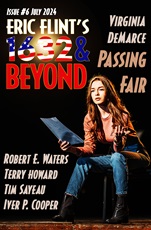 Eric Flint’s 1632 and Beyond #6, July/August 2024
Eric Flint’s 1632 and Beyond #6, July/August 2024
“Passing Fair” by Virginia DeMarce
“From Cramps to Matrimony” by Terry Howard
“Cassini Runs Home” by Robert E. Waters
“A Guest At The New Year” by Tim Sayeau
Reviewed by Victoria Silverwolf
[Editor’s note: The following is offered by Tangent reviewer Mike Bickerdike as a guide for those not familiar with this magazine’s concept. Eric Flint’s 1632 and Beyond is a magazine comprising stories set in the late Eric Flint’s “Ring of Fire” or 1632 alternate-history universe. For those unfamiliar with the books, the essential concept is that the town of Grantville in West Virginia became transported (by cosmic accident) from our present day to northern Germany in 1632 during the 30 Years War. The book series extends to dozens of novels. The short stories in this magazine are set within that framework.]
There are two separate but related plotlines in “Passing Fair” by Virginia DeMarce. In one, anonymous letters denouncing theater productions lead to a debate. In the other, questions of racial identity cause tension.
The story’s two themes both question whether it is appropriate to take on an identity other than one’s own. In the case of theater, the answer seems simple, few other than extreme religious fundamentalists objecting to acting in plays. (It should be noted that the person denouncing theater is from the 20th century, not the 17th.) When it comes to race, the question is more complicated.
Linking a pair of seemingly unrelated themes in this manner shows originality and creativity. The racial theme involves a very large number of people, both in the present and in the past, who are related by blood, marriage, or adoption. So many names are mentioned that the story is very difficult to follow; a detailed family tree would be useful. The speculative background is not necessary for either plot.
“From Cramps to Matrimony” by Terry Howard relates how an aristocrat becomes involved, step by step, in merchandising various products that exist thanks to the folks from the future. The situation gets out of hand.
This is a very quiet, undramatic story; one is even tempted to call it trivial. It’s pleasant enough, but forgettable.
The protagonist of “Cassini Runs Home” by Robert E. Waters is the great 17th century astronomer named in the title. When he is a boy, his uncle takes him to Grantville, where he falls in love with baseball. His enthusiasm for the sport is threatened when his uncle’s affair with a married woman makes it seem necessary that they return to Italy.
Baseball fans will appreciate the detailed descriptions of games, while others may find them less interesting. The most intriguing aspect of the story is that the young Cassini is able to read about himself in 20th century books, raising questions of his destiny. In many ways, this is a typical sports story about the struggle to win the Big Game.
In “A Guest At The New Year” by Tim Sayeau, a British aristocrat receives a letter from one of the inhabitants of Grantville. Before being sent back in time, she visited the aristocrat’s home as a tourist, and was told that it was haunted. The aristocrat takes precautions.
The plot, as simple as it is, deals with the problem of changing the past. Perhaps the best thing about this minor tale is that the author writes convincingly about persons of both past and present.
Victoria Silverwolf dislikes baseball less than other professional sports.